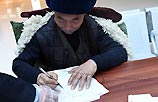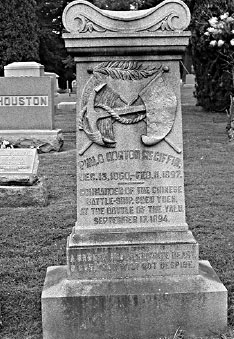Remembering maritime heroes from abroad
Updated: 2015-01-13 08:37
By Peng Yining(China Daily)
|
||||||||
|
A tablet set up in memory of Philo Norton McGiffin in Pennsylvania. |
"I saw a vivid glare in front, and a horrible feeling for about a billionth of a second ... I just thought 'this is death' and knew no more," McGiffin wrote about his experience in the battle.
British officer Alexander Purvis was supposed to return home for a vacation when the war broke out, but insisted on staying and joining the battle as head of the engine department of the battleship Zhi Yuan.
After their vessel had been severely damaged and burned, the Zhi Yuan crew attempted to ram a Japanese battleship but failed. Purvis, aged 29, went down with his ship.
The Chinese people erected two cenotaphs at the port to remember the sacrifice of Purvis and Thomas Nicholls, another British officer who died in the battle at the age of 45.
Li Hongzhang, one of the eight viceroys of China, wrote to the emperor after the battle and said: "They are from overseas, but fought and even died for China. They are brave, loyal and righteous."
The Qing government later gave each of these foreign officers who sacrificed themselves three years' salary as pension to their families.
Learning from the West
Since the mid-19th century, China started to learn from the West to build a modern navy. Starting with preparations in 1875, the Beiyang fleet was commissioned by 1888 and became one of the strongest naval forces in Asia.
China imported the most advanced battleship and weapons from Europe but had insufficient experience, naval professionals and scientific knowledge to navigate this huge modern fleet. In 1881, Ding Ruchang, a Chinese naval officer who became commander of the fleet, brought two battleships from the British city of Newcastle, but could not find anyone in China who knew how to operate the vessels' 10-inch guns.
According to Chen Yue, the naval historian, foreign officers were mostly from Britain, which was the strongest maritime power at that time. Officers also came from France, Germany and the US.
In return, the Chinese government offered attractive salaries, which lured many low-income naval officers from abroad.

 Time to become a woman
Time to become a woman
 The world in photos: Jan 5-11
The world in photos: Jan 5-11
 Belting out a tune for Beijing
Belting out a tune for Beijing
 66-year-old woman risks life, limb to pay off debt
66-year-old woman risks life, limb to pay off debt
 Tourists heat up Beijing's frozen lake
Tourists heat up Beijing's frozen lake
 72nd Golden Globe Awards
72nd Golden Globe Awards
 Marching in solidarity: Paris 'unity rally' in photos
Marching in solidarity: Paris 'unity rally' in photos
 We learn what is love from the 10-year-old schoolboy
We learn what is love from the 10-year-old schoolboy
Most Viewed
Editor's Picks

|

|

|

|

|

|
Today's Top News
Rail merger threatened by insider trading allegations
Suspect relieved to be home
Li Ka-shing retakes Asia's richest person crown
Uber gets no grief yet in taxi-app ban
Black box of crashed AirAsia jet retrieved
Experts praise reform of Chinese leaders, past and present
Ambitious course set for global airliner market
Washington's Chinatown in flux
US Weekly

|

|









